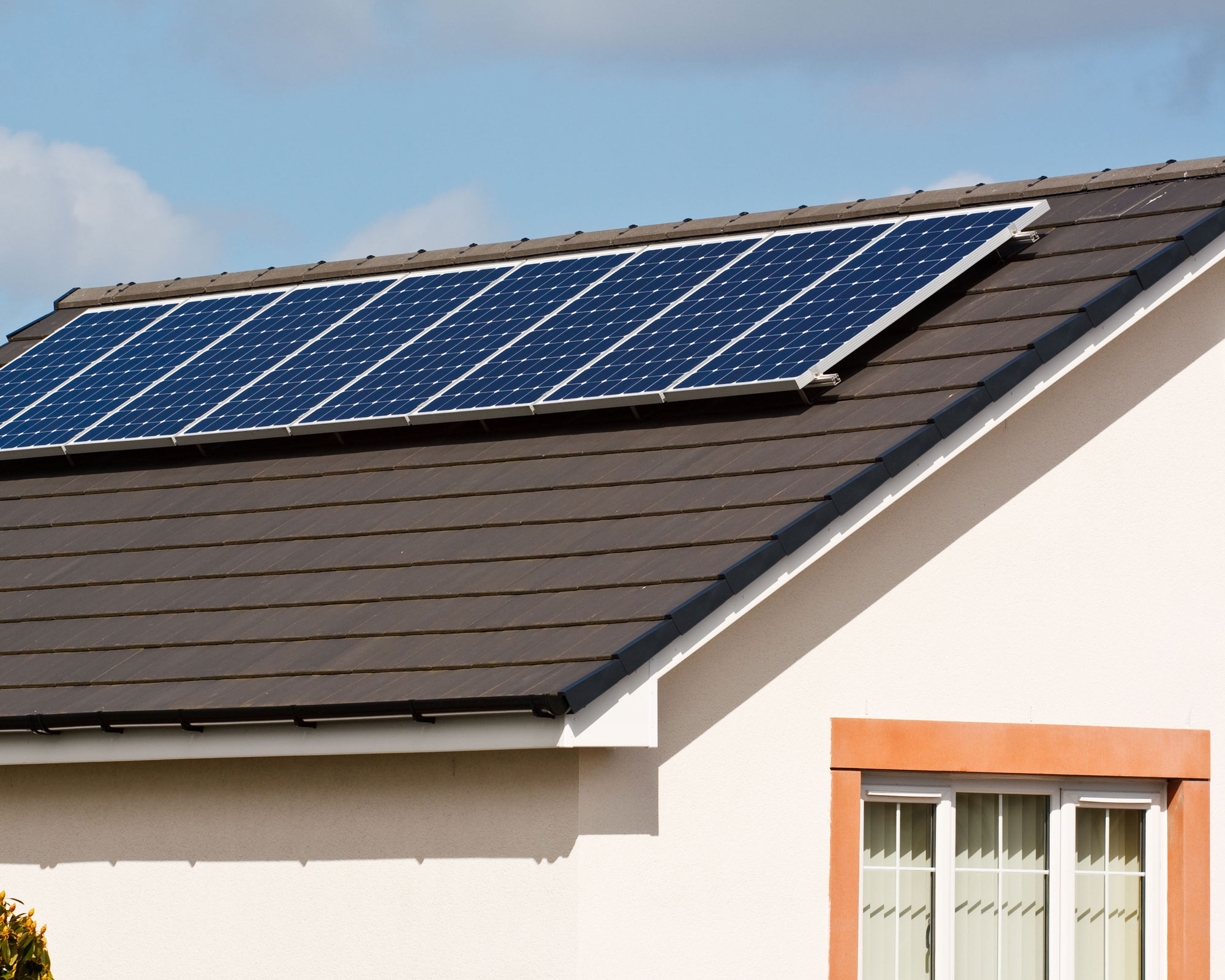A guide to solar panels for the home – the costs and benefits
Fit solar panels for the home and generate electricity, or heat water. Consider the pros, cons and costs.


A growing number of Americans generate electricity with solar panels for the home, and it’s easy to see why. It’s a technology that’s getting cheaper to adopt, one that can save you money on energy bills, and it reduces the amount of carbon emitted into the atmosphere. And of course there are also solar panels that can heat the water for your home on offer.
But you might be wondering if there are any downsides to fitting solar panels for either purpose, and what solar panels cost before committing, as well as how much you can save.
If you’re considering solar panels as one of the possible types of heating for your home, we’ve got the lowdown on the different types on offer, the pros and cons, and how much solar panel installation will cost so that you can make the right decision for you.
Solar panels for the home
There are two different types of solar panels for the home: photovoltaic (PV) and thermal panels.
Solar PV panels generate electricity from sunlight. Solar thermal panels, meanwhile, use the sun’s energy to heat water.
Bear in mind that you may also see solar thermal panels referred to as solar collectors while the systems, which features the collectors plus storage tanks, are referred to as solar water heaters or solar domestic hot water systems.
It is worth thinking about both of these options when you’re considering solar panel installation for your home.
Get small space home decor ideas, celeb inspiration, DIY tips and more, straight to your inbox!
Are solar panels worth it?
If it’s solar PV panels you’re considering for your home, there are a number of factors to look at first, says Ed Shaffer, vice president of Myriad Electrical Contractors, including: ‘Location and type of property; roof design and type – depending on what state, south facing is preferred; local and government incentives and tax breaks; local cooperative payback – how much a kW is the local cooperative offering; and personal budget.
‘These factors will determine if you want to invest money into a system that could take up to 10 years to pay off,’ he explains. ‘The more of the listed factors that are applicable, the quicker the investment could be paid off.’
As for a solar water heating system with solar thermal panels, it is likely to cost more than a conventional water heating system. But the US Department of Energy says, ‘a solar water heater can usually save you money in the long run’.
With a solar water heater system, water heating bills should fall by 50 to 80 per cent, according to the department.
How much does it cost to buy and install solar panels?
Typically, you’ll find that solar panel costs cover both the panels themselves and their installation.
Bear in mind that a federal investment tax credit (ITC) for solar energy systems is in place until December 31st 2023, and applies to both PV and thermal solar panel installation. As well as this federal ITC, there are local rebates, tax credits and other incentives available and you can check what’s on offer where you live at SolarReviews.
What you pay will depend on the size of system, your location, and the particular panels. However, after the federal tax credit a 10 kilowatt (kW) solar panel installation on average costs $20,424, according to solar and renewable energy marketplace EnergySage.
As for a solar hot water system, after the ITC, you’ll pay an estimated $6,300 on average, according to EnergySage. Again, system size matters, so you’ll pay more to provide hot water for a big family home compared to a system for a single person or a couple.
How much do solar panels cost for a 2000 square foot house?
Solar PV panels for a 2000 square foot home are more expensive than solar thermal panels for a property of the same size. ‘On average the cost for a 2000 square foot home will range between $10,000 and $20,000,’ says Ed Shaffer of photovoltaic panels. ‘The cost will vary based on the complexity of the system and the structure that it is being installed on.
‘The cost for a solar thermal system can range from $2000 to $8500 depending on the complexity the system is being designed for.’
The pros and cons of solar panels
Whether we’re talking solar PV panels or solar thermal panels, solar panels for the home have up and downsides. Here’s what to consider:
Solar PV panels
Pros
Harnessing the energy of the sun to generate electricity for your home reduces your carbon emissions as well as your energy bills.
They have a decent lifespan. ‘PV solar cells are long-lasting and can last for up to 30 years,’ says Omer Reiner, licensed realtor and president of Florida Cash Home Buyers.
Solar PV panels are low maintenance although you may need to clean them on occasion.
Cons
Solar panels aren’t right for every home. The roof may not be suitable because of its age, or it might be too shaded. ‘Typically, solar panels perform best on south-facing roofs with a slope between 15 and 40 degrees, though other roofs may be suitable too,’ says the US Department of Energy.
Solar panels will affect the appearance of your home. ‘I often think that one of the most important things to consider is how they are going to look once they are installed,’ says Anthony Maguire, director of Longevity Power. ‘You often see poorly designed, asymmetrical installations that spoil the aesthetic of the house. For that reason, I would always ask to see a mock-up of what the installation is going to look like prior to work commencing.’
Installing solar panels isn’t a DIY job and should be done by a qualified professional. Look for certification through the North American Board of Certified Energy Practitioners (NABCEP).
Solar thermal panels
Pros
Solar thermal panels as part of a solar water heating system use a free resource to generate the hot water for your home, lowering water heating bills and reducing carbon emissions.
They can be used in any climate.
Of the two types of solar panels for the home, solar thermal are much more efficient than solar PV panels, so you’ll probably need to install fewer of them on the roof.
Cons
It’s highly likely that you’ll need the back-up of a conventional water heater for when there’s not enough sunshine, or times when you need a lot of hot water.
It’s preferable to have a qualified solar thermal systems contractor install the system rather than DIYing.
Regular maintenance is vital to keep the solar panels as well as the rest of the system in good working order.
Do you really save money with solar panels?
Yes, you can save money with solar panels for the home as your energy bills will be lower. However, how much you actually save is a little complex.
For solar PV panels, the Department of Energy explains that savings depend on factors such as your electricity consumption, the size of the solar system, and how much power it can generate.
With solar thermal panels in a solar hot water system savings are dependent on variables such as how much hot water you use, how well the system works, your location, the cost of conventional fuels, and the cost of fuel for any back-up water heating system, according to the Department of Energy.
If you’re thinking of solar panel installation, consult qualified professionals to find out more about potential savings for your home.

Sarah is a freelance journalist and editor writing for websites, national newspapers, and magazines. She’s spent most of her journalistic career specialising in homes – long enough to see fridges become smart, decorating fashions embrace both minimalism and maximalism, and interiors that blur the indoor/outdoor link become a must-have. She loves testing the latest home appliances, revealing the trends in furnishings and fittings for every room, and investigating the benefits, costs and practicalities of home improvement. It's no big surprise that she likes to put what she writes about into practice, and is a serial house revamper. For Realhomes.com, Sarah reviews coffee machines and vacuum cleaners, taking them through their paces at home to give us an honest, real life review and comparison of every model.